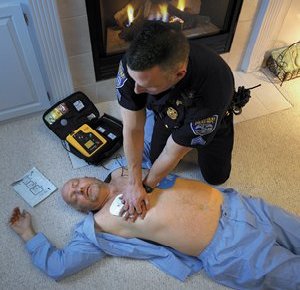
Artistic reconstruction of Isthminia panamensis, a new fossil dolphin from Panama, feeding on a flatfish. (Julia Molnar/Smithsonian Institution)
New Extinct Species of River Dolphin Discovered
Scientists have recently discovered the fossils of a new extinct species of a river dolphin. Since the fossils were found in ocean sediments just off the Caribbean coast of Panama, the new species have been named Isthminia panamensis.
The newly identified species is closely related to the Amazon or Pink dolphin, one of the last remaining species of river dolphins. According to the World Wildlife Fund, the Amazon dolphin, which can only survive in fresh water, can be found today throughout much of the Amazon and Orinoco River Basins in Bolivia, Brazil, Colombia, Ecuador, Guyana, Peru, and Venezuela.
The Isthminia panamenis fossils found by the scientific group were of a single animal and included its skull, mandible, shoulder blade and some flipper bones.
The sediments where the fossils were found have been dated to between 5.8 and 6.1 million years old.
Details of the new species discovery have been outlined by the scientists in the 9/1/15 edition of the journal PeerJ.

An EMS technician performs CPR on a cardiac arrest patient. Behind patient is an automated external defibrillator (AED) which is also used to help stop ventricular fibrillation (David Bruce Jr./Creative Commons)
CPR is More Successful on TV than in Real Life
Researchers at the University of Southern California’s Davis School of Gerontology have learned that medical shows on TV may be painting a somewhat falsely optimistic picture of patient survival after performing CPR.
A new study by the researchers has discovered that fact is more depressing than fiction.
Writing in a recent online edition of the journal Resuscitation, the researchers found that TV show characters who were in cardiac arrest and administered CPR survived about 70 percent of the time. Unfortunately in real life, the survival rate of those receiving CPR after cardiac arrest is nearly half of that at with around 37 percent surviving.
Another discrepancy between TV and reality uncovered by the researchers was that half of the characters who received CPR were able to recovery enough to eventually leave the hospital. In real life, only about 13 percent of patients who are administered CPR actually survive in the long-term.
It is estimated that around 42 percent of older adults say that their health knowledge is based on what they saw on television.
“Most people have no knowledge of actual CPR survival and thus make medical care decisions for themselves and family members based on inaccurate assumptions,” said the study’s senior author Susan Enguidanos, an Associate Professor at the University of Southern California and an expert in end-of-life care in a press release.

Soyuz TMA-18M carrying three new ISS crewmembers heads for space after Wednesday’s launch from Baikonur Cosmodrome (NASA-TV)
New Crewmembers Headed for ISS
The International Space Station will be getting three new crew members, two of which will only be aboard the orbiting laboratory for less than a week.
Sergey Volkov of the Russian space agency Roscosmos, Denmark’s Andreas Mogensen of European Space Agency and Aidyn Aimbetov of the Kazakh Space Agency were launched aboard the Soyuz TMA-18M from the Baikonur Cosmodrome on Wednesday at 0437 UTC.
The trio’s spacecraft is set to dock with the ISS on Friday, 9/4/15.
The three new crewmembers will join Scott Kelly and Kjell Lindgren of NASA, Gennady Padalka, Oleg Kononenko and Mikhail Kornienko of Roscosmos, and Kimiya Yui of the Japan Aerospace Exploration Agency which will bring the total crew aboard the ISS to nine for the first time since 2013.
New arrivals Mogensen and Aimbetov will join current expedition 44 Commander Padalka for a return to Earth on 9/5/11.
Of the three that were just launched into space, only Volkov will remain. He’s expected to take command of the ISS expedition 45 on 9/11/15.
Scientists Develop Natural Antibiotic to Treat Gum Disease
Scientists writing in the American Chemical Society’s Journal of Agricultural and Food Chemistry have found that extract from wild blueberries can help prevent the formation of dental plaque that can lead to gum diseases gingivitis or the more serious periodontitis.
The scientists believe that their discovery could eventually lead to new therapy methods to fight gum disease.
The early stage gum disease, gingivitis, occurs when oral bacteria forms a biofilm or plaques on teeth. This dental plaque can then harden into tartar which then must be scraped away by dentists.
If the gingivitis continues without treatment the inflammatory gum disease can progress into a more serious infection called periodontitis.
This inflammation can spread below the gum line, destroying the tissue that supports the teeth causing tooth loss. In more serious cases of periodontitis, along with having the dental plaque scraped from the teeth, treatment may also require the use antibiotics.
The researchers who were looking for a way to reduce the use of antibiotics in favor of natural antibacterial compounds said that they’re developing an oral device that could slowly release the wild blueberry extract after deep cleaning to help treat periodontitis.
